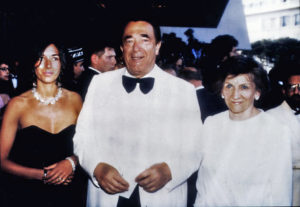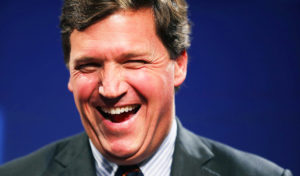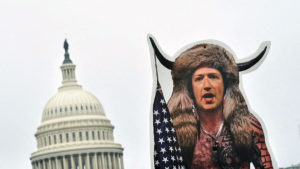Lord Northcliffe — founder of the Daily Mail, inventor of tabloid journalism, the most significant media innovator of the early 20th century — ended up in Hell. At least this was where Ezra Pound put him in his Cantos, “broken/ his head shot like a cannon-ball” alongside various other “news owners”. This has long been the highbrow take on Northcliffe: to condemn a piratical tycoon who taught the Victorian press to swim in the gutter, and who abused his monopoly on the public square to coarsen popular discourse and assert his own interests.
Shovelling information and entertainment was Northcliffe’s business model. His conjuror’s trick was simple: give as many people as possible what they want, and attention and dumb human curiosity can be transformed into merchandise. Nationalism, revolution, Enlightenment — all the forces of modernity sprung up under the transformative systems of print communication and capitalism. Northcliffe was the first to spot the potential of simply merging the two. And where’s the problem with that? Only that, as Pound felt, we don’t seem to like it when the dignity of human communication depends upon the whims of mercurial businessmen.
Northcliffe became the first in the line of suspicious personalities who have owned and administered our media: an evolutionary chart from frock-coated newspaperman to geeky social networker. And it is the megalomaniac perception of Northcliffe that Andrew Roberts seeks to rebut in a new and sympathetic biography. As ever, Roberts has been drawn to a well-fed “great man” of appetite and ambition (his previous subjects include Churchill, Napoleon, and George III). His approach to biography is traditionalist, using the lives of his characters to narrate a broader social and political period. The bulk of this book is therefore concerned with Northcliffe’s role in the political manoeuvres of the Edwardian era.
Throughout, Roberts serves as Northcliffe’s minder as much as his biographer, fending off the slights which have accumulated in the century since his death. (Briefly: Roberts concedes Northcliffe’s paranoid anti-Semitism and occasional brutality, while slapping down accusations of dictatorialism with convincing if over-defensive force.) Northcliffe’s attackers are snobs, he concludes. This man was a self-made genius who spoke for the people. If you don’t like him, comes the implication, perhaps it’s his readers you really don’t like.
Amid all the reputation-management, though, Northcliffe’s most interesting legacy from a 21st-century vantage is neglected. He was the first global tech-media mogul and, like Rupert Murdoch and Mark Zuckerberg, his genius lay in his instinctive understanding of how humanity wished to communicate with itself. As Roberts suggests, more than a “great journalist”, Northcliffe was a “great psychologist”. Press barons of the hands-on variety, now evolved into multiplatform world-emperors, have to be more than men. They are cultural hegemons, portraits of their age, “the way we live now”. Much as digital media now moulds our psychologies, in the time of Northcliffe, as he put it, “Our tons of ink make millions think”.
The British media was, until the 1890s, a staid affair, dominated at a national level by boring newspapers reporting court circulars and parliamentary speeches. It was revolutionised by a demand for something more exciting from a newly-literate office class, and the arrival of men like Northcliffe willing to supply it. Born in 1865 to a respectable family of genteel, Micawberish size and poverty, the young Northcliffe had access to the Establishment, but was outsider enough to scale its walls with the hunger of a parvenu. From his middle-class context, he spotted what every media entrepreneur has since exploited: that people would rather consume something banal than anything important.
His first great hit came in 1888 with Answers, a magazine to which readers could write with questions, which his journalists would answer. This formula launched a thousand inanities (“Can Monkeys Smoke?”; “How Madmen Write”; “What the Queen Eats”) published alongside now very recognisable tabloid featurettes: “Mysteries of a Hashish House”; “Horseflesh as Food”; “Narrow Escapes from Burial Alive”. Answers’s contemporary, doom-scrolling analogues are all too obvious. But the model was only preparation for the launch of Northcliffe’s real triumph in 1896, the Daily Mail, which served up a full Edwardian breakfast of aspirational snobbery, sex scandals and imperial jingoism. The Daily Mail rapidly cornered the market, selling a million copies a day by 1900 and becoming the world’s biggest daily paper.
Nothing dates an era more than its cutting edge, and Northcliffe’s use of electrophone, linotype, rotary presses, ticker-tape and motor vehicles sounds inherently antiquated. But they were the motherboards and algorithms of his day, revolutionising the speed at which his papers could be printed and dispersed. Northcliffe’s technological enthusiasm was also personal. A motorsport enthusiast, in 1909, he was pictured pulling the Wright brothers’ new aeroplane into position, the super-wealthy plaything of its day, much as commercial space travel is ours.
Other innovations were more purely journalistic. A.J.P. Taylor called Northcliffe’s use of the short, punchy paragraph, “the greatest advance in communication since the abandonment of Latin for English” — a judgement which seems excessive, until you recall how the civilisational importance of 280-character communiques has been chewed-over for the past 10 years. And Northcliffe did have an eerie apprehension of the accelerationism that modern media would create. In a 1901 article titled “The Simultaneous Newspapers of the Future”, he laid out a vision for a duopoly of two global papers, providing synchronous news thanks to the telegraph and telephone. It was a remarkable foresight for such a Gutenberg-brained individual.
The Mail became the first colony in an empire. Several of our most famous titles were launched or at some point owned by Northcliffe: the Daily Mirror, the Observer and, in Northcliffe’s greatest coup over the Establishment, The Times. By 1914 Northcliffe controlled just under half of daily newspaper circulation and with popular appeal came political power. Northcliffe was raised to the House of Lords in 1905 but kept his political interventions backstage. His headlines helped destroy governments, but even more breath-taking was his reach. When Northcliffe published an editorial on his vision for peace after the Great War, he was read across the Empire, the United States, Europe and Japan. His dream of a global newspaper seemed almost a reality.
After Northcliffe’s death in 1922 he was succeeded in the role of press baron and political Machiavel by Lord Beaverbrook (Daily Express, Evening Standard) and Northcliffe’s little brother Lord Rothermere, who had to sell The Times to cover the death duties on Northcliffe’s vast estate, but retained much of the rest, including the Mail. (It would be considerably harder to write such a defensive biography of Rothermere, who was on personal terms with Hitler and praised his “great and superhuman” work.) But Northcliffe’s spiritual successor in ambition and ingenuity was, of course, Rupert Murdoch. As Roberts covers (with a respectful nod to Rupert in his acknowledgements), Northcliffe had even been a personal mentor to Rupert’s father Keith, who some nicknamed Lord Southcliffe.
It was Murdoch fils who seemed to inherit Northcliffe’s feline charm and instinctive media nous. He took Northcliffe’s principles and dialled them up (for instance: bypassing Edwardian sexual priggery with Page 3 models). And unlike Northcliffe, Murdoch had the historical luck to apply two-dimensional tabloid energy to the three-dimensions of multimedia and broadcasting. With satellites and cable television as its printing presses, the Northcliffe formula survived the multimedia shift intact.
But the digital media innovation of the past 25 years has been, simply put, to de-editorialise. To merge private and public communications so they all occur in the same place. Northcliffe and Murdoch were lumbered with the assumption that they at least had to produce material for people to enjoy. But a new generation saw that by building and owning the means of communication they could remove this middleman. Murdoch isn’t at home in the 21st century — the foul-mouthed, burly Logan Roy outgamed by his gawky, slimy Silicon Valley replacements. Simply create the right host platform, and there’s no need to churn out those stories about rapist boxers, bulimic royals and online paedos.
People would generate their own tabloid press, pouring their personal lives onto the new media platforms, soon to be joined by the legacy media outlets who can’t afford not to be there. To put it in terms Northcliffe would understand: the Royal Mail and Post Office, The Times and the Mail, intimate diaries and international news reports, all jostling in the same terrifying ecosystem. As Richard Seymour has described it, now “we are all scripturient”, all responsible for turning in the copy we then go onto consume.
Does it do humanity any good to talk to itself so much, to know itself so well? Mark Zuckerberg thinks so, believing that it will foster understanding and empathy. All while building a business that has stoked the lowest human instincts, titillating and piquing our anger, tribalism, lechery and self-loathing, and indulging these atavisms simply because they keep us scrolling and watching and reading. Understanding Lord Northcliffe lets us see the longevity of this dynamic, a modern and very human struggle between what is important, and what is footling and ephemeral, but captivating.
Matthew Arnold, the great Victorian technophobe, set the tone for the snooty attitude of some towards the twittering machine when he saw the telegraph as “that great rope, with a Philistine at each end of it talking inutilities!” But much as we might condemn those who preside over our deracinated media landscape — or even wish them in Hell — the savage irony is the same one Northcliffe spotted over a century ago: they’re only giving us what we want.
Disclaimer
Some of the posts we share are controversial and we do not necessarily agree with them in the whole extend. Sometimes we agree with the content or part of it but we do not agree with the narration or language. Nevertheless we find them somehow interesting, valuable and/or informative or we share them, because we strongly believe in freedom of speech, free press and journalism. We strongly encourage you to have a critical approach to all the content, do your own research and analysis to build your own opinion.
We would be glad to have your feedback.
Source: UnHerd Read the original article here: https://unherd.com/




